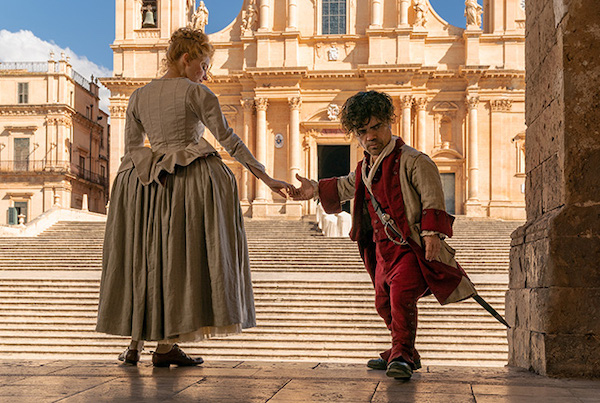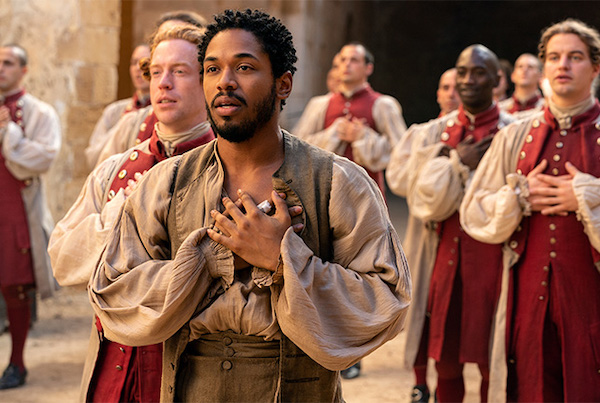Film Review: “Cyrano” — Beauty Is Truth, Truth Beauty
By Peg Aloi
There is much to recommend in this opulently romantic film.
Cyrano, directed by Joe Wright. Screening at the Somerville Theatre, Coolidge Corner Theatre, and other cinemas in New England

Haley Bennett and Peter Dinklage in Cyrano. Photo: MGM
Director Joe Wright has crafted some of the finest romantic heritage films of the 21st century. His 2005 version of Pride and Prejudice (from an adapted script by Deborah Moggach) is arguably the gold standard of how to bring Jane Austen’s most romantic novel sumptuously and intricately to the screen. His 2007 film of Ian McEwan’s Atonement (screenplay by Christopher Hampton) is similarly romantic, though also tinged with the despairing sadness that inevitably comes with films about World War II. Then there’s the heady, sumptuous, heartbreaking Anna Karenina (2012); all three films starred Keira Knightley. Any good love story contains struggle and striving, even pain and betrayal; which is why romantic comedies, full of jokes and silly coincidences and improbably romantic encounters, are a separate genre unto themselves.
Certainly the story of Cyrano de Bergerac (Edmund Rostand’s 1897 stage play, made into nearly a dozen films) lends itself to comedy, as we saw with Fred Schepisi’s 1987 film Roxanne, which stars Steve Martin wearing a ridiculous prosthetic nose. Of course, it is important for Cyrano to have some sort of physical impediment or deformity to underscore his pain, wounded pride, and wistful yearning for a cherished love that eludes him. In this ravishingly beautiful and rather tragic version of the story, adapted by Erica Schmidt from her stage play, Peter Dinklage (The Station Agent) is Cyrano, a brave soldier and soulful poet whose size prevents him from being the manly lover he so longs to be.
As often happens, when one character has an unrequited passion for another, the former is often a much more impressive human being than the latter: this intensifies the dramatic sense of tension and injustice. Consider all the intelligent and beautiful women who fall for absolute cads. But consider also all the Cyranos who fall for their Roxannes: in this case Haley Bennett, whose breakout performance in Swallow established her as an actress of remarkable gifts. And those familiar with the story know that it is Roxanne’s somewhat shallow infatuation with the handsome soldier Christian (here played by the charismatic Kelvin Harrison Jr.) that blinds her to the deep romantic devotion Cyrano feels for her. Roxanne and Christian fall in love at first sight, two beautiful people drawn like magnets to iron.
In the opening scene of Cyrano, Roxanne is dressing for the theater, lured to the show via an invitation from the wealthy, lecherous Duke De Guiche (a wonderfully villainous Ben Mendlesohn). Her dresser Marie (The Dig’s Monica Dolan) warns Roxanne of the Duke’s plan to propose marriage. But Roxanne can’t afford the tickets and desperately wants to see the play, so off she goes, in a flowing green silk gown (a sly visual reference, perhaps, to the notorious green gown worn by Cecilia in Atonement). In the carriage en route to the theater comes the film’s first musical number: Roxanne softly muses about finding a lover who sees and appreciates her for who she really is. In the streets, people are dancing and sometimes singing along (as folks do in musicals): everyone, it seems, rich and poor, young and old, yearns for this idyllic experience of love. But Roxanne cares about more than romance; she has qualities that make her admirable beyond her angelic beauty and grace. She is smart, thoughtful, kind, and loyal. Her sensitive appreciation for poetry and wit proves to be the plot’s linchpin: her love of words galvanizes Cyrano to win her for another beau, while digging himself deeper into the pit of despairing unrequited love.
Cyrano forces himself onto the stage during the performance. He interrupts the antics of a dandified thespian whose posturing and arrogance the critical Cyrano finds insulting. A nobleman challenges Cyrano to a duel for this impertinence and an outraged audience, including his childhood friend Roxanne, cheers them on. The second musical number has Cyrano, via an anachronistic rap style rant, singing about his ignoble birth and traumatic youth, his pride and refusal to bow before anyone. The lyrics are witty but the song is, well, awkward and feels out of place. In fact, I found the songs throughout to be a bit of a drag on the story, especially the love songs, which were a bit too sweet, to the point of being saccharine. There are two exceptions: a paean to male entitlement sung by the Duke (who knew Mendlesohn was such an evil ham?) and a simple, moving trio of farewells sung by soldiers on the battlefield, one of them Glen Hansard of Once and The Commitments. If the melodies and lyrics are often unremarkable, the cinematic expression of the musical numbers is often glorious, filled with thrilling choreography, breathtaking costumes (by Jacqueline Durran), and a stunning use of sets. Cinematographer Seamus McGarvey (who also shot Atonement and Anna Karenina) outdoes himself. Wright takes to heart the notion that musicals are powerful because they tap into a deep-seated desire: there are times when we want so much to live in a world where our yearnings and triumphs compel us to burst into song and dance in the streets.

Kelvin Harrison Jr. in Cyrano. Photo: MGM
But what this story is really about is how love is a lie we tell ourselves. Love is a heartbreak we fight to shield ourselves from. Love is a fiction we dearly wish to inhabit. Christian can’t impress Roxanne with his words, so he asks Cyrano to do it for him. Cyrano can’t declare his love for Roxanne, so he witnesses her rapture vicariously via Christian. The letters written by Cyrano are the juicy heart of the affair: we see Roxanne reading and caressing them in her airy bedchamber, wearing diaphanous pastel gowns, singing of her lover’s beauty and charms. But the sensual thrill Roxanne feels when she reads Christian’s letters (written by Cyrano) becomes an icy rebuke when he can’t speak prettily to her in person. Bennett’s whirlwind of emotion in these scenes — desire tempered with disappointment — is stunning. Roxanne wants a man who is literary, who can speak in pretty verse as if it’s his native language. Christian is handsome and brave, but also conceited and stubborn, just as Cyrano is. Once Roxanne seems won over, Christian foolishly believes he can carry on the charade with little effort. Cyrano sees the disaster coming head-on but is helpless to stop it.
You all know the story, but you’ve certainly never seen the protagonist portrayed by an actor of Dinklage’s considerable skill. He plays Cyrano as a tender, cynical, melancholy poet, full of bravery and passion, gifted with quicksilver wit and enterprise. It’s not the actor’s first turn as a romantic lead (he had a recurring role on the series Nip/Tuck that is worth checking out). But it may be the first role that moves him beyond the gimmicky histrionics called for in his role as the bawdy, hard-drinking libertine Tyrion Lannister in Game of Thrones. Dinklage plays Cyrano as a loner and a martyr, but also as a romantic figure who is, perhaps, more pure of heart than is good for him.
There is much to recommend in this opulently romantic film. It is a story of unrequited love, but also a story of war and the ways it can tear people from their loved ones. Visually, it presents a delightful and sumptuous carnival of delights, with crowds of people dancing unabashedly, gallantly, rapturously, in theaters, across market squares, through bakeries, in castle ballrooms, on warships and mountaintops. Everywhere there is life, it reminds us; everywhere there is the bedeviling dream of love.
Peg Aloi is a former film critic for the Boston Phoenix and member of the Boston Society of Film Critics. She taught film studies in Boston for over a decade. She writes on film, TV, and culture for web publications like Vice, Polygon, Bustle, Mic, Orlando Weekly, Crooked Marquee, and Bloody Disgusting. Her blog “The Witching Hour” can be found at themediawitch.com.

